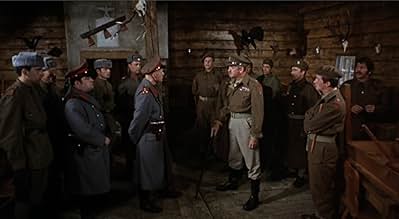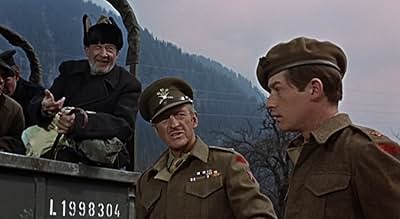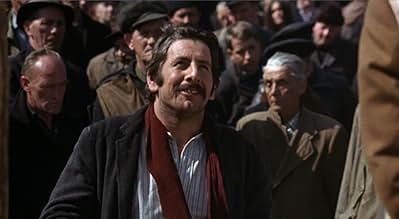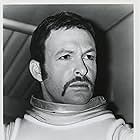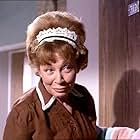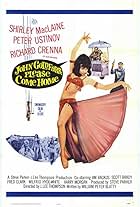Ajouter une intrigue dans votre langueAfter World War II, in an Austrian camp for displaced people, an interpreter mediates between the British and the Soviets regarding the fate of various refugees.After World War II, in an Austrian camp for displaced people, an interpreter mediates between the British and the Soviets regarding the fate of various refugees.After World War II, in an Austrian camp for displaced people, an interpreter mediates between the British and the Soviets regarding the fate of various refugees.
- Réalisation
- Scénario
- Casting principal
Hana Maria Pravda
- Beata
- (as Hana-Maria Pravda)
Avis à la une
David Niven makes a very remarkable performance here as an unwilling soldier in charge of a refugee camp (in the times of 4 million displaced persons in Europe) in Austria, where he has to send many paperless refugees into the Russian zone, where they have nothing good to expect in the days of big brother Stalin. He has a sore past that aches, but as a major in charge he has to stick to his stiff uppper lip, no matter what difficult trials he has to go through again. Topol makes a brilliant performance as the multí-lingual interpreter with many tricks up his sleeve, born in a cart between Tiflis and Tashkent, and he makes the best of it and is thoroughly entertaining, until the bleak reality of no peace after a war sets in, This is really a tragedy of several deep bottoms, and although David Niven is already thoroughly disíllusioned and Topol already is acquainted with the worst and has learned the hard way to survive, John Hurt as the young greenhorn still has his disillusions ahead of him, and they will strike him hard. Fortunately there is Anna Karina for a well needed sort of comfort to all of them.
The film is more serious than it seems, it tries to appear like a comedy, and there certainly are comic ingredients, but the comic gloss cannot hide or smooth over the cruelty of the reality.
Although the dark side of the Stalin regime should have been universally known to the world already after the Stalin trials of 1936, the west was amazingly naïve about Stalin and the true nature of his "communist paradise", as Roosevelt allowed himself to be duped by him and Churchill actually believed in him - until the cold war was a blatant fact, some time after the peace of the second world war, which never really ended but only took on less obvious inhuman activities of darkness.
Chaim Topol's career seems to have dwindled into endless revivals of his great role in 'Fiddler on the Roof' (cf Yul Brynner and 'The King and I'). So it's piquant to reconsider his first big break in Hollywood, two years before the film of 'Fiddler' catapulted him to fame.
'Before Winter Comes' highlights the decline of another once-rampant talent, director J. Lee Thompson. It is a mildly diverting entertainment, notable if only for its unusual setting: not World War two but its chaotic and tragic aftermath in four-power-divided Austria, with refugees in camps or roaming the snowy landscape looking for a home.
The centre of the story is an uneasy love/hate liaison. In the blue corner, bored, stiff, combat-nostalgic British senior officer David Niven ('I am nobody's old boy!'). In the red corner, a wily, Schweik-ish ex-Soviet displaced person whose polylinguality recommends him as a go-between when the UK occupying power is trying to co-exist with Stalin's boys as 'firm friends-- friends but firm'.
Niven could by now play a uniformed part asleep, and occasionally seems to have taken that as an order. His career was in low water at the time. It is a quieter part than in most of the ghastly comedies and capers he was doing at the time, but his bland technique is unaltered. Topol is fire to the Briton's ice: winking, grinning, suddenly looking sober and all-business, but how much is sincere and how much the pedlar's spiel? He's adequate, but Zorba-the-Greekishly unidimensional. Perhaps he always wanted to be liked a wee bit too much.
The film begins as lightish comedy, and tries for a change of pace to gravity and Cold War ominousness after Anna Karina insinuates a disturbing element as the love interest. But the gears clash. It looks like an Alistair McLean international adventure with more laughs, sprinkling doughty British thespians generously (Anthony Quayle as a brigadier, an amazingly unravaged John Hurt as a green junior officer) amid the Babel of displacement. Ron Grainer furnishes a whistling-squaddies theme to make you think of 'Bridge on the River Kwai', but the film lacks Lean's dedication to detail in the service of its message. Ultimately any theme deeper than 'Can't we all just get along?' is elusive. Nor is there any 'Great Escape' element to up the suspense.
The script was by Andrew Sinclair, a curious import to movies (Old Etonian, Cambridge academic, author of satirical novels) who sporadically tried to adapt his sour view of Britain to celluloid. The film looks too much 1969 rather than 1945, with Topol heavily hairy and a plethora of flashy zooms from Gilbert Taylor, Thompson's regular collaborator. They had been together, with Quayle, on 'Ice Cold in Alex'... which, alas, shows what a difference eleven years can make.
'Before Winter Comes' highlights the decline of another once-rampant talent, director J. Lee Thompson. It is a mildly diverting entertainment, notable if only for its unusual setting: not World War two but its chaotic and tragic aftermath in four-power-divided Austria, with refugees in camps or roaming the snowy landscape looking for a home.
The centre of the story is an uneasy love/hate liaison. In the blue corner, bored, stiff, combat-nostalgic British senior officer David Niven ('I am nobody's old boy!'). In the red corner, a wily, Schweik-ish ex-Soviet displaced person whose polylinguality recommends him as a go-between when the UK occupying power is trying to co-exist with Stalin's boys as 'firm friends-- friends but firm'.
Niven could by now play a uniformed part asleep, and occasionally seems to have taken that as an order. His career was in low water at the time. It is a quieter part than in most of the ghastly comedies and capers he was doing at the time, but his bland technique is unaltered. Topol is fire to the Briton's ice: winking, grinning, suddenly looking sober and all-business, but how much is sincere and how much the pedlar's spiel? He's adequate, but Zorba-the-Greekishly unidimensional. Perhaps he always wanted to be liked a wee bit too much.
The film begins as lightish comedy, and tries for a change of pace to gravity and Cold War ominousness after Anna Karina insinuates a disturbing element as the love interest. But the gears clash. It looks like an Alistair McLean international adventure with more laughs, sprinkling doughty British thespians generously (Anthony Quayle as a brigadier, an amazingly unravaged John Hurt as a green junior officer) amid the Babel of displacement. Ron Grainer furnishes a whistling-squaddies theme to make you think of 'Bridge on the River Kwai', but the film lacks Lean's dedication to detail in the service of its message. Ultimately any theme deeper than 'Can't we all just get along?' is elusive. Nor is there any 'Great Escape' element to up the suspense.
The script was by Andrew Sinclair, a curious import to movies (Old Etonian, Cambridge academic, author of satirical novels) who sporadically tried to adapt his sour view of Britain to celluloid. The film looks too much 1969 rather than 1945, with Topol heavily hairy and a plethora of flashy zooms from Gilbert Taylor, Thompson's regular collaborator. They had been together, with Quayle, on 'Ice Cold in Alex'... which, alas, shows what a difference eleven years can make.
After watching Before Winter Comes I'm still trying to figure out the points it was trying to make and where was the humor. Such laughs it had are the grimly ironical kind. As a vehicle for Topol it was quite good for that.
David Niven was playing it serious for once. He plays a British army major who for trying a grandstand play during battle got a whole lot of soldiers killed. Now that World War II is over he's in charge of a displaced refugee camp. Under the strict guidelines set by Yalta he has some rigid instructions as to where to send refugees. No one wants to go to the Russian zone, but that's not his call.
As for Topol when the call goes out for camp interpreter Topol is ready to make himself useful. In fact he's almost too good to be true. Probably he is.
In this film that seems rather pointless Topol is the whole show. A bit of his Tevye from Fiddler On The Roof is here, but his character is more like something Danny Kaye might have done. The script doesn't help Topol, he has to mine some barren land for some laughs.
Niven is not his usual charming self trying to carry a film on that. His character doesn't permit charm. He's in a situation he hates and wants to go back to 'fighting' regiment. But that says Brigadier Anthony Quayle ain't about to happen.
As a vehicle for Topol he proves he can play something other than Tevye, like Yul Brynner being someone other than the King of Siam. But the film really sinks into a bog of pretension in the final analysis.
David Niven was playing it serious for once. He plays a British army major who for trying a grandstand play during battle got a whole lot of soldiers killed. Now that World War II is over he's in charge of a displaced refugee camp. Under the strict guidelines set by Yalta he has some rigid instructions as to where to send refugees. No one wants to go to the Russian zone, but that's not his call.
As for Topol when the call goes out for camp interpreter Topol is ready to make himself useful. In fact he's almost too good to be true. Probably he is.
In this film that seems rather pointless Topol is the whole show. A bit of his Tevye from Fiddler On The Roof is here, but his character is more like something Danny Kaye might have done. The script doesn't help Topol, he has to mine some barren land for some laughs.
Niven is not his usual charming self trying to carry a film on that. His character doesn't permit charm. He's in a situation he hates and wants to go back to 'fighting' regiment. But that says Brigadier Anthony Quayle ain't about to happen.
As a vehicle for Topol he proves he can play something other than Tevye, like Yul Brynner being someone other than the King of Siam. But the film really sinks into a bog of pretension in the final analysis.
When the film was released, Columbia booked it as a 2nd feature. Personally, after trying to sit through it, the studio probably should have shelved it, not necessarily for content, but because that use of flashy zooms became so difficult to sit through that I headed for the lobby more than four times.
In this instance zoom meant zooming in - cut - zoom out - zoom in-cut-zoom out all the way through the film.
The use of zoom lenses in motion pictures was a new tool for filmmakers at the time, but its application here made the film impossible to sit through, at least in a theatre. Until now, thought it had all but disappeared forever.
Not sure if time has changed any of this.
In this instance zoom meant zooming in - cut - zoom out - zoom in-cut-zoom out all the way through the film.
The use of zoom lenses in motion pictures was a new tool for filmmakers at the time, but its application here made the film impossible to sit through, at least in a theatre. Until now, thought it had all but disappeared forever.
Not sure if time has changed any of this.
David Niven stars in this rather unremarkable post-war comedy drama set in an Austrian camp that sorts out and repatriates displaced people. He leads the British contingent with Ori Levy ("Capt. Kamenev") his Russian counterpart with whom he has an uneasy sort of truce. Topol is their charismatic interpreter/peace broker "Janovic" who oils the wheels of their procedures - but he has a secret and when Niven and the Russian find out, he finds life becomes quite precarious. The comedy struggles, to be honest - Niven tries hard, but Topol too hard - neither seem to really want to be here. The presence of the naively optimistic young "Lieut. Pilkington" (John Hurt) and the cynical "Brig. Bewley" (Anthony Quayle) - who is aware of an incident in Niven's past, suggests that there is an underlying message in the film, but nothing really hits home. There are duty versus compassion clashes, and imperialist versus communist ones too - but the setting and characterisations don't support any real substance to these, and the films flails a bit before an ending that is surprisingly robust.
Le saviez-vous
- AnecdotesAlysoun Austin's feature-film debut, playing the role of "A.T.S. Driver."
- GaffesThe John Hurt character (Lieutenant Pilkington) has long hair, like John Lennon, not in keeping with British army regulations.
- Citations
Major Burnside: What languages do you speak?
Janovic: Russian, Polish, Greek, Hungarian, German, Romanian, Bulgar, Serbo-Croat, Romani, Italian, some Arabic, some Yiddish, a little Chinese.
- Crédits fousOpening credits prologue: OCCUPIED AUSTRIA SPRING, 1945
Meilleurs choix
Connectez-vous pour évaluer et suivre la liste de favoris afin de recevoir des recommandations personnalisées
- How long is Before Winter Comes?Alimenté par Alexa
Détails
- Durée1 heure 47 minutes
- Rapport de forme
- 1.85 : 1
Contribuer à cette page
Suggérer une modification ou ajouter du contenu manquant

Lacune principale
By what name was Avant que vienne l'hiver (1969) officially released in India in English?
Répondre
